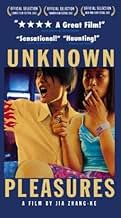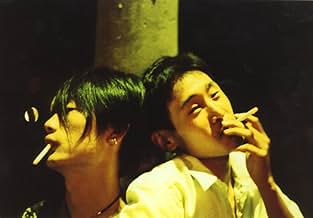VALUTAZIONE IMDb
6,8/10
2748
LA TUA VALUTAZIONE
Aggiungi una trama nella tua linguaTwo unemployed Chinese teenagers have trouble resisting the temptations of the Western world.Two unemployed Chinese teenagers have trouble resisting the temptations of the Western world.Two unemployed Chinese teenagers have trouble resisting the temptations of the Western world.
- Regia
- Sceneggiatura
- Star
- Premi
- 2 vittorie e 5 candidature totali
Limin Wang
- The Karaoke Customer
- (as Wang Li Min)
Juan Antonio Samaranch
- Self
- (filmato d'archivio)
- (non citato nei titoli originali)
Jia Zhang-ke
- Man singing in street
- (non citato nei titoli originali)
Recensioni in evidenza
I don't recall where I read a favorable review of this art film, but if I did I would make sure I don't rent anything else they recommend. This film went nowhere. Two Chinese boys with no motivation. They don't take any risks really, and neither do the filmmakers. I was not left with any particular emotion or thought. Photographically it was OK. Perhaps the filmmaker was going for Bergman type effect of portraying emotional emptiness. And maybe its a cultural translation I'm not getting.
Saw parts of China not seen before - the more urban dirty landscape.. So that was a plus. I liked the girl. Her character had the most um, character.
Saw parts of China not seen before - the more urban dirty landscape.. So that was a plus. I liked the girl. Her character had the most um, character.
The story begins with an outline of the mundaneness of the lives and future of two Chinese youths, and progresses into showing in a short amount of time just how much their lives and personal situations change; dealing with unemployment, troublesome love lives and coming into their own a beautiful story unfolds.
With allusions to the film Pulp Fiction throughout and a recurring song that touches the heart, with solid performances by all of the actors (especially Zhao Tao) it was a very good film. My only criticism is at times the story can be slow, though overall the story is far more interesting than one sees in normal cinema.
The film was particularly strong in the simplistic nature of the film-making itself, with nothing ever over-the-top. It aimed to tell the situation as how it really is, and to tell life like how it really is, not some sort of Hollywoodized conception of life. The artistic reflection that was put into the film shows a great and amazing depth to it that is often hard to find.
Overall, a great film my Jia Zhang-ke. The feelings of hopelessness that he is able to make oneself feel make this a must-see for anyone who enjoys sad cinema and existentialism, and is interested in the struggles of youth and issues of modernization and globalization.
With allusions to the film Pulp Fiction throughout and a recurring song that touches the heart, with solid performances by all of the actors (especially Zhao Tao) it was a very good film. My only criticism is at times the story can be slow, though overall the story is far more interesting than one sees in normal cinema.
The film was particularly strong in the simplistic nature of the film-making itself, with nothing ever over-the-top. It aimed to tell the situation as how it really is, and to tell life like how it really is, not some sort of Hollywoodized conception of life. The artistic reflection that was put into the film shows a great and amazing depth to it that is often hard to find.
Overall, a great film my Jia Zhang-ke. The feelings of hopelessness that he is able to make oneself feel make this a must-see for anyone who enjoys sad cinema and existentialism, and is interested in the struggles of youth and issues of modernization and globalization.
Unknown Pleasures is a fantastic film, but not one I would recommend to my friends. When you're used to seeing Hollywood film-making, it's difficult to watch a Chinese movie that makes other indy films look glitzy.
This is not a film that reaches out and grabs you. The camera keeps an unemotional distance from the characters at first, and only through the use of repetition and extended, unedited shots, does the filmmaker draw the viewer's attention to the subtle details which make this film so powerful.
The main characters dream in a world of American pop-culture and pro-Chinese propaganda, but the camera captures their bleak existence with devastating realism. Through his rejection of western cinematic techniques, the director brings this film brilliantly to life. Yet, for this very reason, many viewers will find it boring.
This is not a film that reaches out and grabs you. The camera keeps an unemotional distance from the characters at first, and only through the use of repetition and extended, unedited shots, does the filmmaker draw the viewer's attention to the subtle details which make this film so powerful.
The main characters dream in a world of American pop-culture and pro-Chinese propaganda, but the camera captures their bleak existence with devastating realism. Through his rejection of western cinematic techniques, the director brings this film brilliantly to life. Yet, for this very reason, many viewers will find it boring.
Unknown Pleasures is the first Jia Zhang Ke film that I have seen and it is excellent. The setting is a town in the north of China, but it could be anywhere in the developing world - India, Argentina or South Africa, for example - where neo liberal economic policies have benefitted the urban elite, but created dislocation for millions of others. The director undoubtedly has a deep social conscience.
The film focuses on several young people, members of China's "new new" generation. As the films progresses, we see what the new world order offers them - US currency, American pop culture, the 2008 Olympics, new super highways - contrasted with the reality - few opportunities for young people, laid off state factory workers and a general degradation of moral values. The message is clear: the new world order offers common people everything in return for giving up traditional ways of life, but actually delivers little of substance. As Bin Bin puts it when he finds out that his girlfriend is going to Beijing to study international trade: "WTO is nothing. Just a trick to make some cash."
The social realist style - it has a bit of a documentary look to it - and the pop song which the film is named after and which features prominently in it (Ren Xiao Yao - the lyrics speak about youth alienation, particularly a desire for freedom and pleasure) also provide a cutting edge look and feel. The song is emotive and will strike a chord with those who like explorations of youth alienation.
However, the film, as befits the political and artistic climate in China, is very subtle and understated, and may escape those who have little knowledge of current affairs in China or an insensitivity to the economic and social dislocation that is taking place outside the big cities (this is not a good date movie for the corporate Western expat and his urban Chinese girlfriend who measure progress by the number of new condos and Western restaurants in Shanghai).
This is great indie filmmaking, though, and I would particularly recommend it to socially and politically aware twenty and thirtysomethings who like artistic expression that is intelligent, socially conscientious and cutting edge.
The film focuses on several young people, members of China's "new new" generation. As the films progresses, we see what the new world order offers them - US currency, American pop culture, the 2008 Olympics, new super highways - contrasted with the reality - few opportunities for young people, laid off state factory workers and a general degradation of moral values. The message is clear: the new world order offers common people everything in return for giving up traditional ways of life, but actually delivers little of substance. As Bin Bin puts it when he finds out that his girlfriend is going to Beijing to study international trade: "WTO is nothing. Just a trick to make some cash."
The social realist style - it has a bit of a documentary look to it - and the pop song which the film is named after and which features prominently in it (Ren Xiao Yao - the lyrics speak about youth alienation, particularly a desire for freedom and pleasure) also provide a cutting edge look and feel. The song is emotive and will strike a chord with those who like explorations of youth alienation.
However, the film, as befits the political and artistic climate in China, is very subtle and understated, and may escape those who have little knowledge of current affairs in China or an insensitivity to the economic and social dislocation that is taking place outside the big cities (this is not a good date movie for the corporate Western expat and his urban Chinese girlfriend who measure progress by the number of new condos and Western restaurants in Shanghai).
This is great indie filmmaking, though, and I would particularly recommend it to socially and politically aware twenty and thirtysomethings who like artistic expression that is intelligent, socially conscientious and cutting edge.
Unknown Pleasures portrays Bin Bin and Xiao Ji, two young Chinese men living in the city of Datong, several hundred miles west of Beijing. Theirs is a city in transition; crowded streets and apartment blocks back onto building sites, weird landscapes of debris and raw materials. The growing commercialisation of Chinese society is readily apparent; in an early scene the duo attend a lurid road show promotion for alcoholic drinks. The television news that punctuates the film shows the changes and conflicts in China and the effect these are having across the world, from the controversial US spy plane crash to the award of the Olympic games for 2008.
The two young protagonists are outsiders in their changing city. Bin Bin, newly unemployed, lives with his mother. Unwilling then unable to find new employment, he becomes increasingly despondent. His relationship with his girlfriend, Yuan Yuan, is lived out in front of a television screen: they rarely make eye contact. The cultural void in his life feels remarkably Western. Xiao Ji works for his father's garage business. Whilst Bin Bin becomes increasingly downcast, Xiao Ji dreamily pursues Xiao Wu, a dancer with the aforementioned road show, risking the anger of her volatile boyfriend.
The overlapping stories of the two friends develop a common theme of loneliness and yearning on the fringes of a rapidly changing society. The sense of despair and malaise in their lives is powerfully conveyed, but the increasing aimlessness of their activities makes for slow and often difficult viewing. The final third of the film is particularly slow, with many drawn-out scenes. Despite this slackening of the pace, an unexpected twist at the end rams home the film's message that, along with the new freedoms in China, there is disenchantment with the new shape of society.
The two young protagonists are outsiders in their changing city. Bin Bin, newly unemployed, lives with his mother. Unwilling then unable to find new employment, he becomes increasingly despondent. His relationship with his girlfriend, Yuan Yuan, is lived out in front of a television screen: they rarely make eye contact. The cultural void in his life feels remarkably Western. Xiao Ji works for his father's garage business. Whilst Bin Bin becomes increasingly downcast, Xiao Ji dreamily pursues Xiao Wu, a dancer with the aforementioned road show, risking the anger of her volatile boyfriend.
The overlapping stories of the two friends develop a common theme of loneliness and yearning on the fringes of a rapidly changing society. The sense of despair and malaise in their lives is powerfully conveyed, but the increasing aimlessness of their activities makes for slow and often difficult viewing. The final third of the film is particularly slow, with many drawn-out scenes. Despite this slackening of the pace, an unexpected twist at the end rams home the film's message that, along with the new freedoms in China, there is disenchantment with the new shape of society.
Lo sapevi?
- QuizMandarin title refers to a song by Richie Jen
- Citazioni
Mr. Ren: Welcome to auditions for the Mongolian King Liquor Troupe! Please applaud our city's famous singer and dancer, Miss Zhao Qiao Qiao, in her modern dance number titled "Unknown Pleasures". The performance reminds us the Mongolian King spirits! Drink Mongolian King! Drink Mongolian King!
- ConnessioniFeatures La rivolta del cielo (1961)
I più visti
Accedi per valutare e creare un elenco di titoli salvati per ottenere consigli personalizzati
Dettagli
Botteghino
- Lordo Stati Uniti e Canada
- 11.254 USD
- Fine settimana di apertura Stati Uniti e Canada
- 3628 USD
- 30 mar 2003
- Lordo in tutto il mondo
- 55.901 USD
Contribuisci a questa pagina
Suggerisci una modifica o aggiungi i contenuti mancanti




















